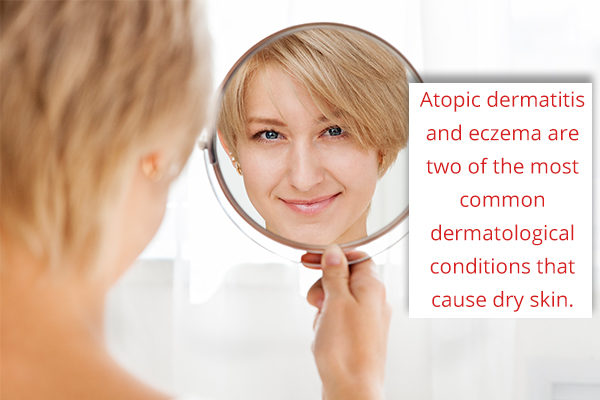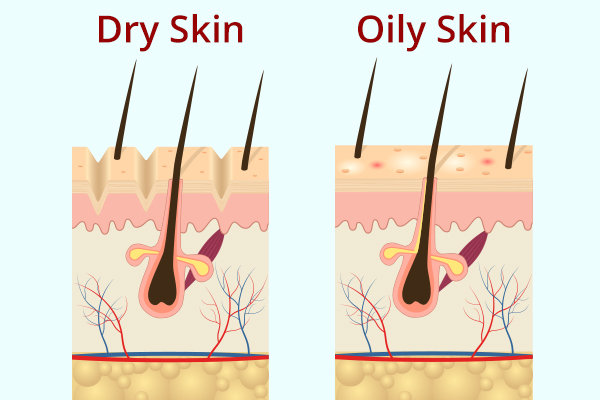In this article:
Dry skin, medically known as xerosis, can occur at any age. The skin appears to be dry, irritated, inflamed, and peeled. While it is generally a mild problem, in some cases, it may be indicative of other skin diseases, malnutrition, thyroidism, or diabetes.

This article discusses various methods to help manage and prevent dry skin conditions.
Causes of Dry Skin
Dry skin can commonly occur as a result of decreased water intake. It is more common in winters due to the following reasons:
- The cold winter air loses moisture to condensation and thus can readily pull water from the skin (especially of the lips and hands). The lipids of the skin’s stratum corneum are robbed of moisture, leading to skin dryness.
- People also put on the heaters in their homes during the winter. The dry heat mixed with the cold air coming in from the outdoors will cause a warm, dehumidified environment.
- The frequent hot showers people take to defrost is also not helpful.
- Hot water also damages the cells of the epidermis, which further impairs the skin barrier, thus leading to dryness.

Many other factors can contribute to dry skin, including:
1. Anxiety, depression, and generalized emotional stress
High levels of stress and anxiety can cause a progression from dry skin to a full-blown eczema flare-up, especially if the patient is frequently scratching due to anxiety and stress.
2. Scratching
Scratching dry skin can worsen the itch (pruritus) by further breaking down the skin barrier and exposing the nerves in the skin. (1)
3. Skin conditions
Atopic dermatitis, or eczema, is most closely associated with dry skin due to a genetic or acquired disturbance. This condition produces as a pruritic red rash of the extremities and trunk, but it can also affect the face, scalp, and genitals.
4. Hormonal changes
Another important category of medical conditions associated with dry skin is endocrine (hormonal)-related conditions, such as hypothyroidism, diabetes, and menopause.
5. Certain medications
Medications used to treat breast and prostate cancer also play roles in the occurrence of dry skin. Diuretic antihypertensive medications can also promote dry skin.
6. Systemic diseases
These include HIV, kidney and liver diseases, malignancy (leukemia, lymphoma, solid organ tumors, malnutrition, and vitamin deficiencies).
Skin Care Routine Tips for Dry Skin
The following skin care routine can be followed if you are suffering from dry skin:
- After a lukewarm to warm (not hot) shower or after gently cleansing your face, apply an emollient (cream, ointment, or lotion) to “trap in” the moisture. Ideally, moisturizers should be applied twice a day.
- Opt for a cream over an ointment for the face as this is less greasy and less “heavy” (rubs in more readily), thus avoiding the tacky feeling over the eyelids.
- You can choose a facial cream with niacinamide as it lowers the chances that your moisturizer will trap sebum in pores, thus preventing acne. Hyaluronic acid is also advantageous for the face as it plumps up the skin and thus softens fine lines and wrinkles.
- Opt for a cream with lactic acid, salicylic acid, or urea for the hands to prevent fissures and cracks from developing on the fingers and palms.
- For the shins, elbows, knees, heels, and waistline, choose a “heavier” and more “viscous” moisturizer as these surfaces are involved with frictional rubbing.
- Using an ointment or thicker cream is like creating another layer of skin over these sites to prevent cracking or fissuring with friction (i.e., waistline rubbing with pants, heels from running/walking).
- For children, apply a generous amount of ointment over them after a bath (while the skin is still moist) and then immediately cover with their pajamas. While they sleep, turn on the humidifier during the night.
Lifestyle Tips and Self-Care Measures for Dry Skin
Living a well-balanced lifestyle that addresses diet, exercise, sleep, and mental well-being is important for your skin health.
1. Stay hydrated

Staying hydrated is a must for maintaining a healthy skin barrier and so is cutting down on dehydrating drinks such as alcohol. Without an adequate barrier, your skin will dry out easily.
However, I would not recommend “excessive” drinking of water as this can cause issues with your electrolytes (especially sodium levels) and your water weight.
2. Consume a well-balanced diet
For any skin condition, I always recommend a well-balanced diet with a combination of zinc sources (good for collagen cross-linking and a zinc deficiency can cause dry skin), fruits, nuts, vegetables with vitamins C and E (antioxidants), and fish (fish oil’s omega-3 may be anti-inflammatory).
3. Increase antioxidant intake
Consider the intake of antioxidants, such as vitamins C and E, in your diet for general skin health. (2)
4. Manage stress
I recommend breathing exercises, yoga, (3) or regular cardiovascular exercise and good sleeping habits (4) (average 7–8 hours of sleep per night) to prevent stress-related exacerbations.
5. Apply Vaseline
It is bland, readily available, affordable, and non-irritating. It is great to apply after topical steroids for itch (due to dry skin or eczema) as it will “seal in” the topical steroid.
Preventive Measures for Dry Skin
The best way to prevent dry skin is to keep your skin hydrated and moisturized.
- “Trap” the moisture gained from a lukewarm shower/bath by applying an emollient after pat drying the skin with a towel, leaving the skin still moist.
- Avoid hot, scalding showers or baths and the use of harsh scented soaps (stick to unscented bar soap).
- Avoid scrubbing and exfoliating aggressively as these habits will damage the epidermis.
- Shorten your shower/bath time to less than 10 minutes.
If your dry skin issues and itching do not improve with over-the-counter moisturizers, please see your dermatologist for additional help.
Dry Skin vs. Oily Skin

Each skin type presents its own advantages and disadvantages.
Dry skin yields fewer complaints of feeling “greasy” over the forehead and nose and perhaps fewer issues with enlarged oil glands or acne. However, excessively dry skin can also develop acne.
When the skin is thirsty for moisture, it sends feedback to the sebaceous glands to make more sebum. With more sebum, pores will clog more readily, causing inflammatory acne. When you incorporate the right emollient into your acne regimen, you can find better results by controlling oil and dryness.
Another difference between dry and oily skin is the visibility of aging signs. One can argue that having dry skin makes fine wrinkles more visible. Oily skin usually does not pose this problem as the adequate production of sebum softens wrinkles.
Can Skin Cancers Cause Dry Skin?
Skin cancers typically do not cause dry skin, although they can manifest in a way that mimics “dry skin.”
A worrisome sign would be a persistent, localized patch of rough, dry skin or a “bump” with dry skin that has a “sandpaper-like” texture. These can be signs of skin cancer or pre-skin cancer (such as actinic keratosis).
If the area of rough, dry skin grows with time, bleeds, or becomes thickened into a “cutaneous horn,” definitely have the patient see a dermatologist right away for an evaluation.
Final Word
While dry skin is not a severe problem, it can cause a great deal of discomfort. Not managing dry skin can lead to redness, scales, itchiness, and small cracks in the skin.
Keeping your skin moisturized, increasing water intake, and consuming a healthy diet are some simple ways to help keep your skin healthy. However, if the condition persists despite proper skin care, you must consult a dermatologist for any underlying condition.
- Was this article helpful?
- YES, THANKS!NOT REALLY


